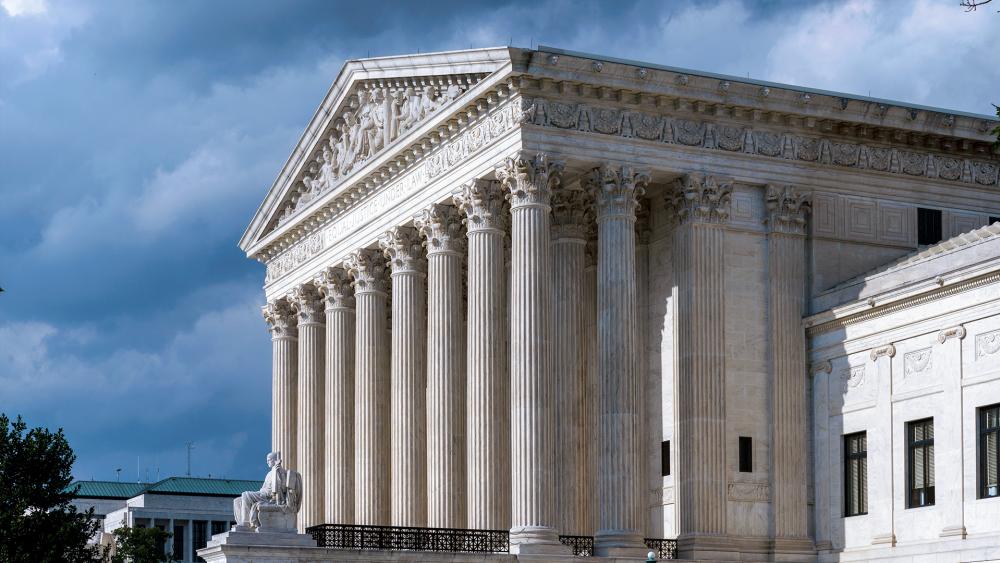The U.S. Supreme Court ruled on Wednesday that the state of Virginia is allowed to resume its purge of non-citizen voter registrations. The state has said its goal is to ensure that people who aren’t U.S. citizens don’t vote illegally.
Virginia’s attorney general had asked the Supreme Court to intervene – just days ahead of the general election – to allow the state to move forward with its removal of roughly 1,600 alleged non-citizens from its voter rolls.
The request came after a federal appeals court upheld a federal judge’s order Sunday to restore the registrations of those questionable voters.
Gov. Glenn Youngkin signed an executive order in August requiring daily checks of DMV data against voter rolls to identify non-citizens.
But the U.S. Department of Justice and a coalition of private groups sued Youngkin claiming the removal violated a provision of the National Voter Registration Act, which requires states to complete programs of removing ineligible voters from registration lists up to 90 days before federal elections.
The Justice Department also claimed that the canceled registrations were, in fact, citizens and they were removed because of bureaucratic errors or mistakes like a mischecked box on a form.
***Please sign up for CBN Newsletters and download the CBN News app to ensure you keep receiving the latest news from a distinctly Christian perspective.***
But state officials argue the canceled registrations followed careful procedures that revealed people who explicitly identified themselves as non-citizens to the Department of Motor Vehicles. They point out that federal law does not provide voting rights to non-citizens who by definition can’t vote in federal elections.
U.S. District Judge Patricia Giles granted an injunction Friday saying Youngkin’s program was illegal and ordered the restoration of the voters’ registrations.
“It should never be illegal to remove an illegal voter,” Virginia Attorney General Jason Miyares said in response to the ruling. “Yet, today a Court – urged by the Biden-Harris Department of Justice – ordered Virginia to put the names of non-citizens back on the voter rolls, mere days before a presidential election. The Department of Justice pulled this shameful, politically motivated stunt 25 days before Election Day, challenging a Virginia process signed into law 18 years ago by a Democrat governor and approved by the Department of Justice in 2006.”
A three-judge panel of a federal appeals court struck down Virginia’s challenge to Judge Giles’ ruling stopping the practice Sunday.
Now the Supreme Court has granted Virginia officials’ request for emergency relief after they argued the 90-day provision does not apply to the removal of non-citizens from the voter rolls.
Miyares’ had also argued that requiring Virginia to restore the voter registrations of non-citizens is a “violation of Virginia law and common sense.”
Last week, a federal judge also ordered Alabama to restore eligibility to the more than 3,200 voters who were deemed ineligible non-citizens.
As CBN News reported, although non-citizen voting in federal elections is already illegal, there is evidence that state officials’ concerns over election integrity are not entirely unfounded.
In a 2016 post-election audit report, the state of North Carolina discovered 41 instances where immigrants who were not yet U.S. citizens voted in state elections.
Eloy Alberto Zayas-Berrier, an immigrant from Cuba, told the Washington Times he can’t qualify for U.S. citizenship and Cuba has refused to take him back.
But even without a green card, he showed up to early voting in North Carolina on Nov. 5, 2016, was invited to register, and cast a ballot.
Juan Francisco Landeros-Mireles joined a line of people at a food pantry and ended up registering to vote. His lawyer, James Todd Jr., said Landeros-Mireles cast a ballot in the 2012 and 2016 elections.
“The fact of the matter is, when you go to vote in person, you are asked your name and your residence and then you’re asked to sign on the list there. There’s no questions about citizenship at that point,” Todd explained.
Earlier this year, House Speaker Mike Johnson (R-LA), Rep. Chip Roy (R-TX), and Sen. Mike Lee (R-UT) introduced the Safeguard American Voter Eligibility (SAVE) Act to bolster efforts to ensure that only U.S. citizens vote in federal elections by requiring proof of citizenship to register.
“We all know, intuitively, that a lot of illegals are voting in federal elections, but it’s not been something that is easily provable,” Johnson said.
Johnson’s legislation would have required voters to provide a form of I.D. including a U.S. passport, military I.D., birth certificate, naturalization certificate, or a government-issued photo I.D. card showing that the applicant’s place of birth was in the United States.
And if someone was voting by mail, they must go to an election official’s office to show proof of citizenship by a certain deadline.
“Proof of citizenship as a requirement to vote in our elections should not be controversial – it is our responsibility to protect the integrity of our electoral process,” Sen. Roger Marshall (R-KS) said.







